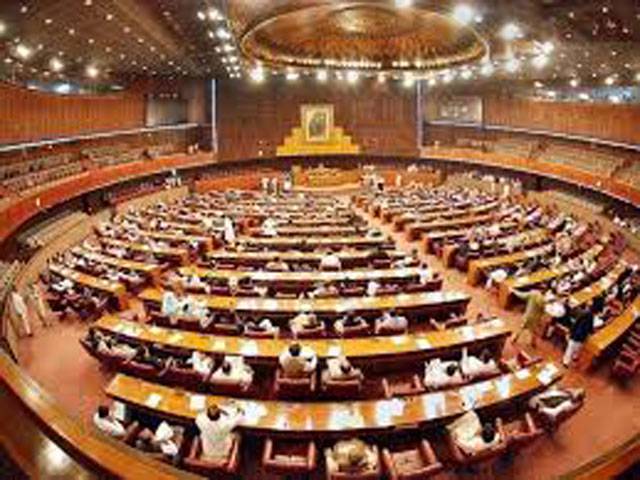ISLAMABAD - Senate on Friday passed a bill that criminalises for the first time sexual assault against minors, child pornography and trafficking.
The amendment to the penal code, which will go into force after being ratified by the president, also raises the age of criminal responsibility from seven to 10 years of age.
Under the revised legislation, sexual assaults will now be punishable by up to seven years in prison. Previously, only rape was criminalised.
Likewise, child pornography, which was previously not mentioned in the law, will be punishable by seven years in prison and a fine of 700,000 rupees ($7000).
Pakistan last August was rocked by a major paedophilia scandal when it was revealed that hundreds of pornographic videos of children from the village of Hussain Khanwala in Punjab province had been created and were being circulated.
About 20 arrests were made, but only the acts of rape and sodomy were punishable by law.
The new amendment also criminalises child trafficking within Pakistan. Previously traffickers were only liable for punishment if they removed children from the country.
"This is a very important step to realise the obligations of Pakistan" under the Convention on the Rights of the Child, Sara Coleman, chief of child protection at UNICEF, told AFP.
"Now we have to turn our attention to the law's implementation," said Valerie Khan, the director of Group Development Pakistan, a local NGO which advocates legal reforms.
She also called for the "establishment of a national commission on child rights, which is essential to monitor and coordinate the implementation of the law."
Staff Reporter adds: The Senate yesterday made a heated debate on national curriculum after a lawmaker showed his concerns over the use of "controversial and derogatory" remarks against Baloch nationals in the curriculum books being taught in Punjab at intermediate level.
At first, the objection came from a treasury member from Balochistan, Mir Kabir, on the last day of the parliamentary year of the Senate who quoted some "insulting" remarks about Baloch people from the book "Sociology of Pakistan" written by Abdul Hamid Thaga.
"Baloch means uncivilised people... who live in the deserts and loot caravans... they loot and kill people," the senator read out some lines of books that he said were being taught at intermediate level in Punjab.
He also quoted a reference from the book saying that Baloch people neither send their girls to school nor their women could go outside for work.
Kabir said that history was being distorted by teaching such kind of stuff, and he put a question mark on the ability of what he said an all time smart looking chief minister of Punjab.
Leader of the House Raja Zafarul Haq remarked the issue was serious in nature and demanded formation of a committee to inquire into the matter.
Another treasury member, Mushahid Ullah Khan said that there was need to examine what kind of curriculum the next generation was being taught. A serious action is needed, he said.
Senator Usman Kakar from Balochistan viewed that the remarks reflected a typical mindset and prejudice.
Senate Chairman Mian Raza Rabbani remarked that he would take up the matter with Punjab chief minister and inform the house in the next session as to what action would be taken against the author.
"The whole curriculum was rewritten under an ordinance issued by then military dictator General Ziaul Haq. Children are being taught that there are 12 advantages of dictatorship and eight of democracy," he lamented.
This has been justified in the curriculum that military takeovers were necessary because democratic set ups had failed to deliver, he said and added: "It is being taught only in one paragraph how East Pakistan got separated from West Pakistan."
Rabbani said the Senate has already recommended that constitutional history should be made part of curriculum and the house had conducted a study on this issue.
The lawmakers also congratulated Senate chairman for completion of parliamentary year of the Senate as well as of his chairmanship.
Senator Mushahid Ullah Khan said that "good things introduced by the chair should be institutionalised".
PPP Senator Farhatullah Babar on a point of public concern drew attention towards reports aired by international media that a disillusioned defector of militant organisation Daesh had passed a stolen computer disc of documents identifying over 20,000 of its facilitators in over 50 countries to a UK journalist.
He said that the information contained about the countries to which these operatives belonged, their expertise in carrying out various militant operations and a list of people who had volunteered to act as suicide bombers to further its cause. He called for examining the possibility of investigating this treasure house of information to find out Daesh supporters and operatives in Pakistan if any.
Senator Mushahid Hussain Syed questioned the remarks of British Foreign Secretary he gave on March 8 during his visit to Pakistan that Kashmir issue should not be a precondition between India and Pakistan talks.
"The British Secretary has no mandate to advise Pakistan about the way to deal with India as he never gave such advice to India." He also mentioned the statement of John Kerry that the Pakistan should control its nuclear weapons. He said that Foreign Ministry should take notice of both these issues.
PTI Senator Azam Swati raised the issue of recent arbitrary transfers of officers in the Election Commission. He said that ECP made more than 100 transfers in violation of code of conduct and the government should seek report on it. "This is the way it is heading towards 2018 elections," he said.
The government said that the decision was as purely on administrative grounds as the commission had the powers to do so.






